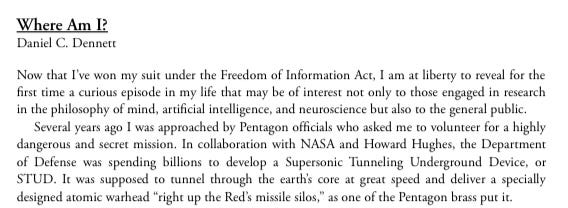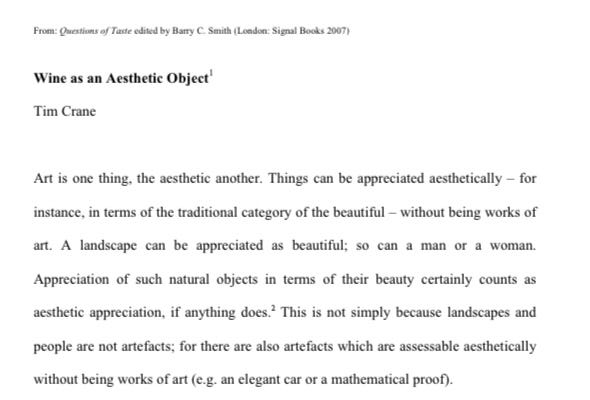TLDR:
Thirteen Days, Robert F. Kennedy
Where Am I?, Daniel Dennett
Intermezzo, Sally Rooney
Wine as an Aesthetic Object, Tim Crane
Devils v Capitals, Capital One Stadium
This is the third in a regular series.1 As with the previous two editions, I’ll move beyond ‘things I’ve been reading’ in the final item.
1) Thirteen Days (1969) is Robert F. Kennedy’s account of the Cuban Missile Crisis.2 That is, the time during which it seemed nuclear war might result from America’s discovery of a secret Soviet missile stash in Cuba. It’s a short but detailed book, in which RFK acts as trusty narrator, keeper of his brother’s legacy, and hero protagonist. This combination gives its details a fantastical edge. RFK not only knew — or wants us to think he knew — more than anyone else in the world about the crisis. He also had more than his own skin in the game. It’s hard not to like him for what he says, however. Ok, this is partly because I love the Kennedy aesthetic (beautiful guys writing beautiful speeches). But what stands out is his discussion of the approach taken by the committee charged with determining America’s first response. You kinda want this group of guys around, today. (Yes, they’re all guys; yes, that’s stupid; yes, RFK is dated in his talk about this.) But even the ones with crazy views are able to take, as well as give, criticism. So they argue it out, entering a Zen-like Rawlsian state of deliberating about modes of deliberation. And RFK shows such pride in it all. “The fact that we were able to talk, debate, argue, disagree, and then debate some more was essential to choosing our ultimate course,” he tells us. “But more than time is necessary,” he continues. “I believe our deliberations proved how conclusively important it is that the President have the recommendations and opinions of more than one individual, of more than one department, and of more than one point of view.” Now, whether it’s true that RFK and his brother were as deeply pluralistic as RFK wants us to believe is more than we can learn from this book. Nonetheless, their behaviour, as described, stands as an inspiring model. We should learn from it now, when — as I wrote about a few days ago — we’d do well to think harder about the risks of nuclear war.
2) As part of my ongoing practice of reading classic twentieth-century philosophy papers, this week I returned to ‘Where am I?’ (1978), which is the story of one man’s courageous attempt to save the people of Tulsa from a buried nuclear warhead. Or is it? One of the many questions Daniel Dennett poses in this short-story thought experiment is whether ‘Where am I?’ is indeed the story of just one man. Dennett begins by telling us about the time he allowed Pentagon operatives to remove his brain, relink it to his body via radio transceivers, and store it in a vat. And how his body then headed off to Tulsa to retrieve the buried warhead (a radioactive task no brain could’ve survived). Many high jinks later, and Dennett finds himself with two brains, two bodies, and a shift of query from ‘where am I?’ to ‘who am I?’. It’s all very neat, and it's fun trying to identify the passing philosophy references (Eliot has nothing on Dennett here). But by the end, I can’t help feeling like a kid who’s just learned the answer to ‘As I Was Going to St Ives’. You’ve added up all the cats and the kits! You’ve remembered to include the original man! And then you discover you needn’t have read past the first line. If you can’t bring yourself to accept Dennett’s initial move — that personhood could’ve survived his initial debraining — then the rest of the paper is ultimately deflating.
3) Sally Rooney’s fourth novel, Intermezzo (2024), is about two brothers, their differences, and the women in their lives. It took me three attempts to finish this book, but I kept going because each time I liked it more. Indeed, I liked parts of it very much, and particularly the scenes focused on the younger brother, Ivan, and his girlfriend, Margaret. Some of these scenes are really beautiful. What kept making me stop, however, was the writing — much of which I found extremely distracting. Rooney is clearly experimenting with her style, and whilst I think I get her goal, it just doesn’t work. She’s trying to do what multiple first-person perspective does, but in the third, and it's jarring, and sometimes the voices get confused. This is most evident in the sections focused on the older brother, Peter, and especially the conversations he has with his ex-girlfriend, Sylvia. These conversations are supposed to represent the depth of their ongoing love, yet sometimes Rooney’s descriptions descend into list form: “Something about fascism he says and they go on walking, talking about fascist aesthetics and the modernist movement. Neoclassicism, obsessive fixation on ethnic difference, thematics of decadence, bodily strength and weakness. Purity or death. Pound, Eliot.” Call me a purist, but I don’t want to be reminded that I’m reading a novel! I also found Margaret, Sylvia, and their respective problems, really underdrawn. These women feel at times like the pathetic heroines of third-rate Victoriana, thinking twice about ordering a second lemonade at the pub, and sighing endlessly. I thought Rooney’s first book was very good. I’m still waiting for a return.
4) The other day, I was thinking about the aesthetic greatness of wine, so I reread ‘Wine as an Aesthetic Object’ (2007) by Tim Crane. This is more than an excellent example of philosophical writing about wine, it’s also really excellent on aesthetics, much more generally. I particularly like his discussion of the distinction between art objects and aesthetic objects, and the careful but convincing manner in which he argues that we should categorise wine as the latter. It’s also funny, and insightful on the value of music. If you like wine, or other good things, you should read it.
5) Last weekend, I went to my first ever ice hockey match: the Washington Capitals playing the New Jersey Devils, at the Capital One Arena in DC. I am now a big fan of hockey! And particularly its conventions. I wouldn’t have assumed I’d enjoy a sport in which the fights are so celebrated they’re replayed on the Jumbotron. But I really did. The icing (sorry) on the cake was experiencing the trailing Capitals ‘pulling the goalie’ in the final few minutes. If you pull the goalie, you swap your goalkeeper for an additional player up front, in the hope of powering through to score a needed goal before the opposition takes advantage of your open net. It didn’t work out for the Caps, but it played into my love of mechanisms that enhance competition, and made me like the hockey all the more.
I’m intending to publish one of these ‘five top things’ pieces each Sunday (so the last couple of Sundays you can count as aberrations).
The original RFK, of course.









